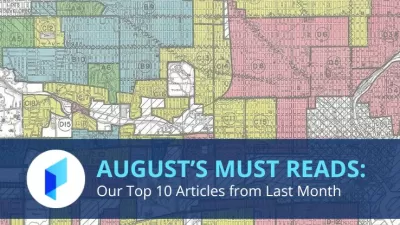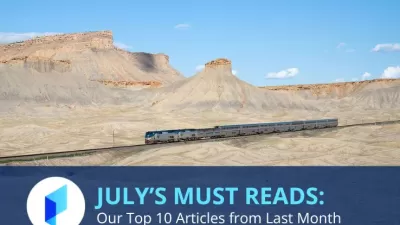Planetizen readers were most interested in March stories about Oregon’s urban growth boundary, New York City congestion pricing, planning with AI, parking reform, and more.

March was a big news month for urban planning. Below is a curated list of the ten most impactful stories on Planetizen, from a groundbreaking one-time exemption to Oregon’s urban growth boundary to the innovative AI tool designed specifically for urban planners, and the ongoing, contentious debate over congestion pricing in New York City. You can also explore the evolution of U.S. shopping malls, the expansion of public transit in Atlanta, and an examination of whether free parking should be considered a public good.
1. The Mall Is Dead — Long Live the Mall
In the most popular Planetizen article in the month of March, Alan Ehrenhalt explores for Governing the evolution of U.S. shopping malls through Alexandra Lange's Meet Me by the Fountain and Kate Black's Big Mall, emphasizing their departure from Victor Gruen's original communal vision but highlighting their enduring social significance, with potential for redevelopment into multifunctional community spaces.
2. Oregon Passes Exemption to Urban Growth Boundary
The Oregon legislature in March passed a bill allowing cities a one-time exemption from regulations to acquire land for housing, in exchange for ensuring 30 percent of new units are affordable, with a requirement that affordability be maintained for 60 years, while also allocating over $370 million for infrastructure and homelessness initiatives.
3. LA Freeway Ramp ‘Quietly Canceled’
The Los Angeles County Metropolitan Transportation Authority (Metro) and the California Department of Transportation (Caltrans) quietly abandoned plans for a proposed freeway off-ramp near downtown LA because of significant environmental and community impacts, following a full environmental review prompted by a 2018 lawsuit, effectively canceling the long-contested 110 Adams Terminus Improvement Project.
4. Where Urban Design Is Headed in 2024
An article from the Daily Journal of Commerce discusses key trends shaping the development sector in 2024. Amid the changing dynamics of office spaces, there is a growing emphasis on adaptive reuse of buildings, the non-negotiable demand for sustainable design practices, and shifts toward mixed-use districts and designs catering to the needs of older demographics.
5. Atlanta Announces Four New MARTA Stations
Atlanta Mayor Andre Dickens unveiled plans for the largest expansion of the Metropolitan Atlanta Rapid Transit Authority (MARTA) system in decades, including a new station at Murphy Crossing along the Beltline's Westside Trail and three other infill stations, aiming to enhance connectivity and accessibility while promoting significant mixed-use development in the area.
6. Washington State’s Unhoused Residents Receive Close to Half of Jaywalking Tickets
Following the failure of a proposed Washington state bill to decriminalize jaywalking, the Seattle Times reports unhoused individuals receive a disproportionate amount of jaywalking tickets, highlighting systemic issues of racial bias and the potential consequences of fines on homelessness.
7. Congestion Pricing: New York City’s Next Hero
Planetizen blogger Marcelo Remond advocates for congestion pricing as a solution to alleviate traffic congestion in New York City, emphasizing its potential to generate revenue, reduce carbon emissions, and improve overall quality of life, while addressing concerns about equity and fairness, and highlighting its potential benefits for public transit and the environment.
8. Downtown Chicago Vacancy Rates at All-Time High, Slashing Building Values
An article from Bloomberg CityLab highlights Chicago's revival of the "LaSalle Street Reimagined initiative" amid the city's downtown commercial real-estate crisis. The city seeks to repurpose vacant buildings in its central business district to combat soaring vacancy rates and plummeting commercial building sale prices, reflecting a broader trend across U.S. metros in repurposing office spaces for alternative uses.
9. PlanGPT: A New AI Tool Specifically for Planners
Researchers have introduced PlanGPT, the first AI tool tailored specifically for urban planners, and tout its potential to enhance precision in information extraction from urban planning texts, addressing the limitations of general-purpose large language models, and offering higher-quality responses in typical urban planning tasks.
10. Rethinking the Notion of Parking as a Public Good
This Planetizen-exclusive from urban planner David Mepham, author of Rethinking Parking: Planning and Urban Design Perspectives, explores how the conventional view of parking, which is primarily from the perspective of the driver, overlooks the broader impacts on urban environments and policy outcomes.
To stay up-to-date on the latest news and exclusive content from Planetizen, sign up for our email newsletters, including the twice-weekly Newswire and the monthly Planetizen Updates.
Editor’s note: Portions of this Planetizen blog post were generated using OpenAI’s language model, ChatCPT. Planetizen editors have been looking into ethical uses of AI in journalism and wanted to test it. In this post, ChatGPT was used to summarize previously published Planetizen stories, which provided text that served as a starting point and then was edited and refined further. We want to assure our readers that any future policies adopted around the use of AI on Planetizen content will be grounded in transparency.

Trump Administration Could Effectively End Housing Voucher Program
Federal officials are eyeing major cuts to the Section 8 program that helps millions of low-income households pay rent.

Planetizen Federal Action Tracker
A weekly monitor of how Trump’s orders and actions are impacting planners and planning in America.

Ken Jennings Launches Transit Web Series
The Jeopardy champ wants you to ride public transit.

Crime Continues to Drop on Philly, San Francisco Transit Systems
SEPTA and BART both saw significant declines in violent crime in the first quarter of 2025.

How South LA Green Spaces Power Community Health and Hope
Green spaces like South L.A. Wetlands Park are helping South Los Angeles residents promote healthy lifestyles, build community, and advocate for improvements that reflect local needs in historically underserved neighborhoods.

Sacramento Plans ‘Quick-Build’ Road Safety Projects
The city wants to accelerate small-scale safety improvements that use low-cost equipment to make an impact at dangerous intersections.
Urban Design for Planners 1: Software Tools
This six-course series explores essential urban design concepts using open source software and equips planners with the tools they need to participate fully in the urban design process.
Planning for Universal Design
Learn the tools for implementing Universal Design in planning regulations.
Heyer Gruel & Associates PA
Ada County Highway District
Institute for Housing and Urban Development Studies (IHS)
City of Grandview
Harvard GSD Executive Education
Toledo-Lucas County Plan Commissions
Salt Lake City
NYU Wagner Graduate School of Public Service





























